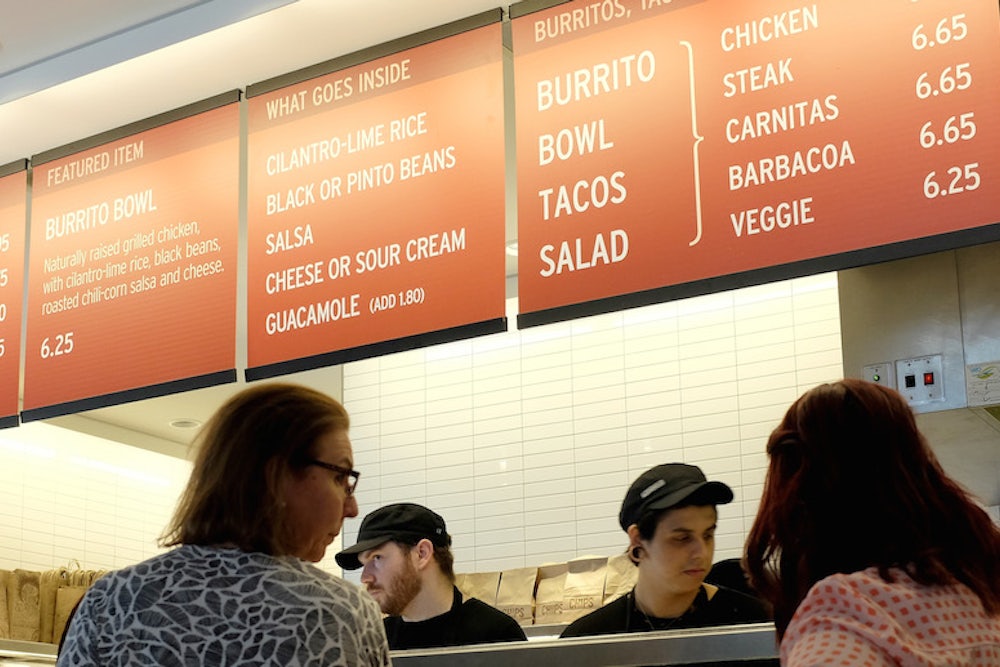This morning, Chipotle unveiled a line that takes celebrity endorsement to a whole new literary level. Jonathan Safran Foer, George Saunders, Toni Morrison, Michael Lewis, and Malcolm Gladwell have teamed up with the burrito joint to design cups and bags that feature original essays and stories, specifically created for the bored fast-food diner’s consumption. Foer (disclosure: Jonathan Safran is brother to my boss Franklin Foer) told Vanity Fair that he was eating a burrito in Chipotle, sans book or smartphone, and grew terribly bored. “I really just wanted to die with frustration,” he told the magazine.
Now, arguments can be made that without a smartphone or book in hand, the imagination should be a suitable partner to keep oneself occupied. But in a world that continually celebrates the screen over the page, why not expand our literary horizons and quell boredom with whatever is close at hand?
Here are seven more contemporary writers whose work was practically designed to be read in public spaces:
Colson Whitehead on Manhattan’s Subway Walls
By the time the zombie-killers of Zone One have retreated into lower Manhattan’s subways, it’s become clear that the new world they’ve built just might be headed for disaster. Whitehead’s keen understanding of the nebulous, neither-here-nor-there nature of the subway—along with his innate understanding of the unique inner workings of the contemporary New Yorker—makes him the perfect person to color the MTA’s walls with his metaphors for modern life.
Cheryl Strayed on Hiking Trail Markers
You’re alone in the woods, perhaps for the first time. Your feet have more blisters than skin. You are certain you can’t take another step. And you could only make room for one damn novel in your pack and you finished it 34 miles ago. Wouldn’t a leaflet by the sharp and empathetic author of Wild be just the thing to get you over the next hill? Wherever you see another wooden trail marker, there too you could find more words from a woman who not only feels your pain, but is also the ultimate advice-giver.
Nick Hornby on The Back of the Stadium Seat in Front of You
You don’t need to have read Fever Pitch to appreciate that Nick Hornby is the superfan of all superfans. His delightful “Books I’m Reading” column in The Believer is often half-filled with excuses about why he hasn’t been reading—an abundance of football (read: soccer) watching is the usual culprit. But no matter where they're published, Hornby’s ruminations on the strange complexity of the contemporary sports freak are revealing and entertaining whether your allegiance is to Manchester United, the Tampa Bay Lightning, or the (groan) New York Yankees. A few lines from him on the back of the seat in front of you would pass the time during the seventh-inning stretch—and bring a little old-school civility to the games.
Joshua Ferris on The Walls of Corporate Elevators
Nobody else gets how much you hate your office. Nobody else gets how entirely crucial the dynamics of that office are to your life, your sanity, your well-being. Nobody else gets how that ride up in the morning steels you for another day and that ride down lets you exhale. Nobody like Joshua Ferris, whose Then We Came to the End is the defining work on contemporary office culture. So let him tag up the walls of corporate elevators with his assurance that we’re all alone in this together.
Don DeLillo and Martin Amis in The Backseats of Taxis
The brilliant opening to Amis’ Money is set in the backseat of a cab on its way to JFK and DeLillo’s Eric Packer, from Cosmopolis, has some of his best lines when he notices his wife in the taxi next to him and promptly climbs in. These two masters of the genre get it: some of life’s most illuminating and transportive moments (no pun intended) take place on the sticky black leather of a cab.
Jonathan Miles in Your Airplane Seat-back Pocket
It’s taken you three hours and nearly all your sanity to board a plane and get on your goddamn way to Minneapolis. And now you’ve discovered your novel is snoozetown and your magazine only lasted you the first 40 minutes of the flight. Miles, whose Dear American Airlines made it clear he understood the frustration of the American aviation system better than just about anyone, would be the perfect candidate to design a neatly laminated card full of uproarious and empathic quips for your reading enjoyment.
Jennifer Egan on The Old Brick Walls of Manhattan
They're something you rarely notice until you read A Visit from the Goon Squad—all those faded painted signs bedecking New York brick walls. But once you know they’re there, you see them everywhere you go in the city: old signage for meatpacking warehouses, icehouses, button manufacturers. Who better to fill them in with her musings than the novelist who knows that Manhattan only gets more intriguing when you tear your eyes from your iPhone and look up.
